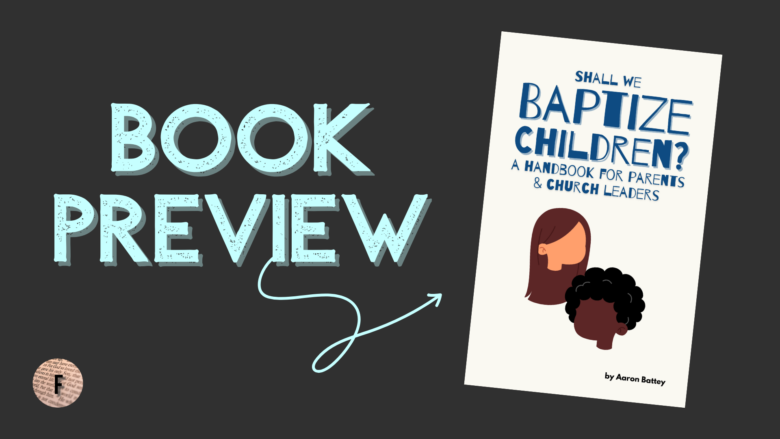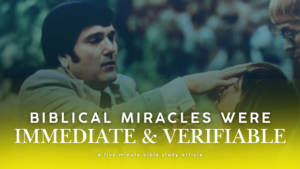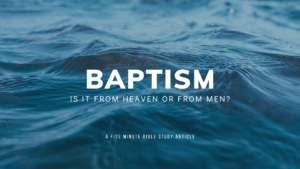The following is a preview of the new book published by Five Minute Bible Study on the subject of baptizing children.
Chapter 1: Introduction
![[Tags] table-of-contents-canva-2.0-300x300 Shall We Baptize Children? (Book Preview)](https://fiveminutebiblestudy.com/wp-content/uploads/2022/12/table-of-contents-canva-2.0-300x300.png)
I was eight years old, and my sister Dorothy was nine years old when we were both initially baptized. One Sunday morning after church services, very innocently, and out of pure curiosity, I asked my pushy uncle C. W. Battey, “How old do you have to be in order to be baptized?”
Uncle C. W. immediately entered panic mode in his efforts to save a hell-bound soul. He said, “I’ll come over after lunch, and we’ll talk about it.”
He came over and sat me down at the kitchen table. He opened a KJV Bible to Acts 2:38 and asked me to read it. I read it aloud. “Do you understand what you just read?”
“Yes,” I said, too embarrassed to say otherwise.
He loaded me and daddy into his car and took us to see the elders of the congregation. My uncle did all the talking. He said to the elders, “Little George wants to be baptized.”
“Well, if he wants to be baptized, we can’t stop him,” the elders said.
That evening Uncle C. W. gave the lesson. During the invitation song, Daddy pushed me out into the aisle. Uncle C. W. waved me forward and sat me on the front bench. Everyone sat down after the song ended. Uncle C. W. stood me up and said, “Do you believe Jesus Christ is the Son of God?”
“Yes,” I said.
“Upon that confession, I will baptize you for the remission of your sins.”
He then took me into the water and baptized me. This happened that Sunday evening at the second service. My sister Dorothy got baptized the following Wednesday night. By the time I was fifteen I realized I was not accountable at the age of eight, but I had never heard of anyone being “re-baptized.” Brother John Modgling came through Albuquerque and held a meeting at our congregation. I decided I didn’t care what anyone thought. I went forward and told Brother John I needed to be baptized. He baptized me, and that’s when I consider myself becoming a Christian. Dorothy was baptized later too. She was probably about twenty.
Looking back, I remember one funny thing about this experience. Even at the age of eight, I knew from Acts 2:38 that, when a person gets baptized, he “receives the gift of the Holy Spirit.” The church in Hobbs always gave a new Bible to everyone who was baptized. I was baptized on Sunday and the following Wednesday (when Dorothy was baptized), the church gave to me a new copy of a KJV Bible.
I thought to myself, “This must be the gift of the Holy Spirit which the Bible promised I would receive.” I was happy with my “gift.”
This story was written by George Battey, my father and published with permission. There are many details found in this story that will resonate with the reader after having completed this book.
Personal Testimonies
Interestingly, I performed somewhat of a poll on social media before my father ever told me about his baptism story. What follows are personal testimonies from adults in the Church of Christ who were baptized as a child and re-baptized as an adult. These are true accounts used with permission. The only details changed are slight grammatical tweaks and names or information that might be used to identify the person writing.
“I was baptized when I was younger due to the pressure of my grandmother. I didn’t do it for the right reasons. It was basically just to make my grandmother happy. I was baptized again as an adult, because I realized I didn’t do it the first time for the remission of sins.”
“I was dunked when I was nine or ten years old. I basically had no clue what I was doing; I was acting on a fear of going to hell if I wasn’t baptized. I had no understanding of repentance; I’m not sure I was even old enough to understand what repentance was, or if I even had anything to repent from. I was in my thirties when that began to bother me. I was baptized again at that time with a full knowledge of what I was doing.”
“I was baptized at thirteen years old, but I was converted at thirty-one. When I was thirteen there were about five other teenagers in my congregation. A preacher gave a very graphic and convicting sermon on the crucifixion of Jesus. All five of us were baptized that day. When I look back, I remember my dad talking to me about the seriousness of baptism on a couple of occasions. In balance with the rest of my life up to that point, I had been told so many times how bad I was and how much we all deserved hell. I believed I was headed straight for hell. Now I realize that ‘we all’ really meant ‘humanity.’ I believed it meant ‘me.’ I remember thinking about how cool it would be to partake of the Lord’s supper with my peers. I remember going to public school and not understanding why my school acquaintances didn’t care that I got baptized, as if it was some status thing. I became rebellious in my late teen years and into my adult years. Time passed, and I had not gone to church faithfully for close to a decade. I had lived the lifestyle of a sinner and indeed deserved hell. I hit rock bottom when I was about thirty. My baptism had always had me questioning myself. After a couple of years living faithfully, studying everything I could get my hands on, and discussing my first baptism extensively with a couple of preachers and my dad, I was baptized again.”
“I was baptized at ten years old. I believed it was important to be baptized, and I believed Jesus was the Son of God, but I truly believe I got baptized because several of my cousins did as well. I was baptized again at sixteen, because I didn’t feel like I truly understood what I was doing at ten, or that I had sins that needed forgiven.” “After I was married, a preacher came and held a gospel meeting where I went to church. It was then that I was baptized a second time. I had been thinking about being baptized again for some time, and I finally decided that as a kid being baptized for the first time, I was thinking, “If I want to go to heaven, I have to be baptized.” I think I realized what the plan of salvation was, because I had sat at the feet of gospel preaching my whole life, but I wasn’t truly ready or mature enough to be baptized the first time at age fourteen. I think my parents and the leaders at church felt like if I wanted to be baptized at fourteen, they weren’t going to hold me back. I think another contributor was other young people in the congregation also making the decision to get baptized around that same time. I feel like my first baptism was likely because of peer pressure.”
“I was baptized a second time as an adult. The more I studied, the more I realized I never had a moment where I was convicted of my sin, I needed to repent, and I needed to be saved. As a ten year old, I was baptized because I knew it was right, and I was raised in the church. All in all, it sat much better with my conscience when I was baptized again as an adult. To summarize, I knew baptism was a good thing to do when I was younger, but the gospel convicted me as a young man. I don’t think my readiness was really examined at all when I was baptized the first time as a child.”
“I’m one of those who got wet at twelve years old and was truly immersed later at thirty-one. Originally, I wasn’t studied with, and baptism was just almost like a fad or a trend among the younger kids at church during that time. I didn’t understand it was to forgive my sins, nor did I know I was being added to the church because of my confessional belief in Jesus Christ as Lord. My younger sister and I both got wet the same day. I later left the church at seventeen years old. After coming back to the church, I sat down and read the entire New Testament in two weeks. I was then immersed for the remission of my sins, which were more than many could bear.”
These personal testimonies of being baptized at a young age and being re-baptized at a later age are but a drop in the bucket of actual occurrences. I received these testimonies from Christians within just a few hours after initially posting the social media poll. The very fact that so many Christians have this shared experience is enough reason to write a book. Perhaps through diligent Bible study, prayer, brainstorming, and collaboration, we might be able to unveil some scriptural light on a very confused subject matter, if at all possible.
What the Church of Christ Teaches
Maybe you picked this book up, and you’re not a member of the Church of Christ. It’s very possible that you are already confused by what I described or that you will be confused at some point along the way unless I set a few points of doctrine straight.
First, the Church of Christ does not teach that children are born in sin. We believe that all humans inherit the consequence of physical death from Adam but not spiritual death. Thus, we do not believe that children are born with a sin nature that must be regenerated by sprinkling or immersion shortly after birth. Catholicism and some sects of Christianity believe and practice this. Neither do we believe in baptizing infants to make them a member of the New Covenant. This is called covenant baptism and will be explored in its own chapter later in this book.
Second, the Church of Christ teaches from the New Testament scriptures that baptism is for “remission of sins.” This is maintained by scriptures such as Mark 16:16; Acts 2:38; 22:16; 1 Peter 3:21, and others. This belief that baptism is the actual point in time at which a sinner has his sins washed away and experiences a change of state from that of an unregenerate sinner to a new creation in Christ stands in stark contrast to what most denominations profess about baptism. Many denominations, Baptists being one example, practice what is called “believer’s baptism.” This is the idea that a sinner becomes a Christian on the basis of faith (mental agreement with facts about Jesus) alone, and then at some point afterward professes this faith to the world in the act of baptism.
Church of Christ preachers have traditionally taught that children are born free from any guilt of sin, and then mature so their conscience begins to operate, at which point they become “accountable.” There is no widespread, agreed-upon age at which all children become accountable of sin and require water baptism to have those sins washed away, but there is at least consensus that children will experience this phenomenon at some point. Each young person is deemed ready for baptism on a case-by-case basis, and the parents are usually instrumental in determining this.
Why This Book?
I have several purposes in writing this book. My foremost purpose is prevention. It has always proved difficult to find common agreement among Christians in answering the question, “How old does a child have to be for baptism?” While this book will very likely prove unable to accomplish more unity on the answer to that question than the hundreds of much wiser men and women before me, perhaps we can at least come to agreement on those cases of baptism where the subject is very young. “Very” young is vague, but what is meant by “very” will be made clearer as the book progresses. Everyone reading this book can very likely think of at least one instance where they were witness to a very young child being baptized. Many times, the certainty of a young person’s innocence and readiness for baptism is difficult to determine, but there are other times when everyone in the room is thinking about how cute the baptism is as opposed to how salvific it is. If this book can help bring about awareness and good reasons to prevent against these obvious cases where a child is being baptized, then its primary purpose will have been accomplished.
My second purpose for this book, in terms of priority, is to inform. I want to give Christian parents some type of scriptural and sound guidance for when their child comes asking to be baptized. Whether talking about an innocent child or a sin-stricken adolescent, the goal is to give parents some type of scriptural direction, and some level of guidance that will help them navigate this difficult and stressful occasion in the life of Christian parenting. Most parents have not had adequate, if any, preparation for that moment when their child comes asking to be baptized. Remaining silent on difficult and controversial subject matters doesn’t always help. The people that actually suffer from the “let’s not talk about it” approach, are the parents in the heat of the moment. Telling them, “God will understand whatever you decide,” or “Just do what you think is best” is not reassuring to a parent. I believe the reason is that most parents likely agree that God would not leave us without some revelatory guidance on one of the most important moments in a person’s life. It seems bizarre to think that God would take the time to inform Christians they should abstain from eating a strangled animal (Acts 15:20), but then go completely silent on the subject of accountability and baptism. Did God go completely silent, or are there biblical principles to learn and apply? This book makes a case for the latter. When this subject is taught on, it has been my experience that parents with young children are very appreciative. A friend of mine recently taught a sermon that was ninety-nine percent in line with the things found in this book. Afterward, he had several Christian parents come to him and express their heart-felt appreciation for his teaching on a subject they had never heard anyone teach on, good or bad. If you read this book and disagree with part or all of it, then please consider parents who are seeking direction in this matter. What would you tell them? Where would you point them to look for guidance? And what are we to make of the countless cases of re-baptism of adults who were initially baptized as young children? These are important questions that objectors are asked to consider.
In the process of preventing and informing, I would like to address common concerns I have heard voiced when it comes to determining a young person’s readiness for baptism. I have grown more and more skeptical about the procedures that grow out of these concerns as I talk to Christian parents about the subject. I have commonly heard parents say things such as, “If we don’t baptize them (children), then they will grow discouraged, and eventually they will stop asking.” When this or similar reasons for baptism are given, it becomes very clear that baptism is not always being administered “for the remission of sins.” As a result, children are frequently baptized, and years later they are re-baptized. The consequences are numerous. If this book can help parents think through the consequences of some common concerns, then the book will also prove successful.
Finally, my goal is to be biblical about the subject matter. It might sound like I am relegating this final purpose to last place, but that is not so. In preventing against very young baptisms, we must be biblical. In informing parents with some type of resource, we must be biblical. In addressing common concerns and procedures, we must be biblical. So, this final purpose is truly the greatest priority. I will try my best to be clear when I am giving my opinion and when I am simply relaying the word of God. While I do not claim to have come up with something that no man has thought up before, I do believe there is much scripture which will make Christians press the pause button on many potential baptisms. I believe there are important biblical concepts, that when brought to the front of this spiritual discussion, should shape our thinking and have a positive effect on how we answer the question, “Is this young person ready to be baptized?”
If my hopes are realized, then parents will at least have some preparation for when their child pops the question. Maybe this book proves inadequate, but if it at least gets parents and leaders thinking and gives them something that is even remotely helpful, then it will have accomplished its mission. At the time of this writing, the only books I am aware of that are written by Church of Christ authors on this subject are Am I Ready? A Study of the Gospel for Young People by Mark Roberts and Am I Ready to Be Baptized? by Kyle Butt and John Farber. Both of these books are written primarily to children instead of parents, and I believe there are shortcomings with both; otherwise I wouldn’t find the need to write another book. Even if other books are out there, this subject needs discussed more than it has been.
Disclaimer: if you are reading this book because you are looking for an exact “age of accountability” at which every single child becomes a sinner and needs baptized, and anyone under that age limit does not need baptized, you can stop reading now; you won’t find that in this book. Some people may read the book and accuse me of this, but I’m making it clear up front that I do not believe this, and you have misunderstood me if you draw such a conclusion from the book. However, if you are looking for some scripturally informed guidelines that you can use to gauge a young person’s readiness for baptism, you will find that and hopefully more.
Summary
This book doesn’t claim to be an answer to all your questions about baptizing children. But at least we’re talking about it now. You will likely learn one or two things that you didn’t know before. You will have plenty of scripture to now consider on this very important subject. And if you are a parent or leader of a congregation reading this, you will now have some resource to appeal to, whereas you likely had little to nothing before.
“Shall We Baptize Children? A Handbook for Parents & Church Leaders” will be available for sale in January 2023. Hard copies of the book will be $10/each (shipping not included). When the book is published, it will also be available for FREE PDF download on fiveminutebiblestudy.com. You can pre-order your copy of the book today by notifying Aaron Battey at ambattey@yahoo.com.



